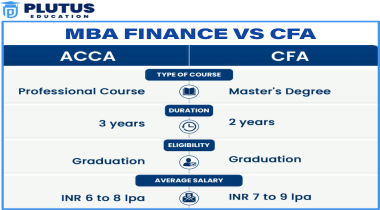The combination of the three is an effective educational tool for anyone who wishes to create a career in finance, business, and management. Knowledge gained from one or more of these qualifications will be added to the professional portfolio, making such an individual skilled to cope with increasingly sophisticated functions in financial management, investment analysis, or leadership. It breaks down each combination, exploring the benefits, various career opportunities available, salary expectations, and factors to consider when comparing ACCA, MBA, and CFA, or a combination of all three.
ACCA and MBA Combination
Combining ACCA with an MBA significantly enhances career prospects as it gives you expertise in both specialized financial skills and broader business management expertise. ACCA equips one with advanced knowledge in accounting and advanced financial reporting. Contrarily, an MBA equips one with crucial leadership and strategic management skills. Together, these qualifications give professionals looking for leadership roles in finance, consulting, or management those tools to succeed.
Why Combine ACCA with an MBA?
The synergy between ACCA and MBA is undeniable, and here’s why:
- Deep Financial Knowledge: ACCA specializes in core subjects like tax and financial management, which provides a niche skill set that is extremely important in the financial sector.
- Strategic Business Acumen: The MBA, on the other hand, will cover broader streams like marketing, human resources, operations, and business strategy, hence making you more general.
- International Acceptance: Both ACCA and MBA are accepted internationally. ACCA is accepted in more than 180 countries. The MBA is considered a doyen of business leadership and a generalist’s qualification worldwide.
- Career Opportunities: An ACCA and an MBA prepare you for a whole range of career opportunities. This encompasses the highest-level accounting jobs to C-suite executive positions.
- Exemption: People who want to pursue an MBA also get ACCA exemption based on their prior academic qualifications or professional certifications. You can also check with our ACCA exemption calculator to be more sure.
Educational Path and Requirements
The educational requirements for each qualification can vary, but here’s a general breakdown:
- ACCA: The ACCA qualification will take three years, depending on your speed and previous qualifications. These tests include financial management, performance management, audit and assurance, taxation, and corporate law.
- MBA: Two-year, full-time MBA and one-year accelerated programs or part-time MBA are followed. These have core business studies like economics, leadership, marketing, and strategy.
Potential Career Paths with ACCA and MBA
Combining ACCA and MBA can open doors to a wide range of career opportunities, including:
- Chief Financial Officer (CFO): The company’s top financial executive who takes care of the company’s funds.
- Financial Controller: Organizes and controls organizational reporting, accounting, and budgeting.
- Management Consultant: A consultant who helps businesses through corporate strategy and finance.
- Director of Finance: This manager takes over the finance management and control of the company, gives it a health check-up, and offers strategies.
Career Opportunities with ACCA and MBA
With an ACCA and an MBA qualification, you would be extremely employable and marketable in the labour market. Professionals with these two qualifications can develop excellent mixes of technical,l financial skills as well as business management capabilities to position them for a wide array of leadership and financial roles.
Industries and Sectors Where ACCA and MBA Hold Value
- Banking and Financial Services: You can expect roles in investment banking, wealth management, corporate finance, and risk management.
- Consulting: Management and financial consultants with these qualifications are highly sought after for their analytical and strategic skills.
- Corporate Leadership: ACCA and MBA graduates often find themselves in executive leadership roles such as CFO, CEO, or Finance Director.
Job Titles for ACCA and MBA Graduates
- Corporate Finance Manager: Responsible for financial planning, risk management, and financial strategy.
- Strategic Business Consultant: Offering advice on improving financial performance, operational efficiency, and overall business strategy.
- Finance Director: Managing the financial activities of an organization, including planning, forecasting, and budget management.
Career Growth and Development
ACCA and MBA holders are neither only well-versed in several roles, nor are they less poised for fast career progression. They have strategic insight and financial sophistication that equips them for movement into executive positions in corporate finance, consulting, or management.
ACCA, MBA, and CFA
Adding the CFA qualification to the ACCA and MBA mix creates an unparalleled trio of qualifications in the finance and investment sectors. CFA is regarded as one of the most respected qualifications in investment management, focusing on portfolio management, investment analysis, and ethical standards.
Why Combine ACCA, MBA, and CFA?
- Advanced Financial and Investment Knowledge: ACCA and MBAs provide a complete set of skills related to finance, accounting, and management, while CFA gives an edge in investment.
- Comprehensive Skill Set: The CFA program exposes one to deep investment analysis, equity research, and portfolio management concepts, which align with the overall financial knowledge that aligns with ACCA and MBA.
- Global Career Opportunities: All the qualifications provided to them—the CFA, ACCA, and MBA are recognized worldwide and enable them to have a career anywhere in London, New York, or Singapore.
Career Paths with ACCA, MBA, and CFA
The combination of ACCA, MBA, and CFA opens up highly specialized and lucrative roles, such as:
- Investment Banker: Focusing on capital raising, mergers, and acquisitions.
- Portfolio Manager: Managing investment portfolios for high-net-worth individuals or institutional clients.
- Equity Analyst: Analyzing stocks and securities to provide investment advice.
- Chief Investment Officer (CIO): Overseeing an organization’s investment strategy and portfolio management.
Time and Educational Investment
- ACCA: 3 years to complete.
- MBA: 1-2 years.
- CFA: CFA consists of three levels, and candidates typically take four years to complete all three levels due to the depth and complexity of the material.

ACCA, MBA, and CFA Salaries
Professionals with ACCA, MBA, and CFA qualifications are likely to earn some of the highest salaries in the finance and investment industries. Salary can differ from industry, role, and geographical location, but generally, these qualifications are associated with higher earnings.
Salary Ranges Based on Qualification Combination
Here’s a breakdown of expected salaries based on different combinations:
- ACCA and MBA: In the UK, ACCA and MBA holders earn an average of £70,000-£120,000 per year. In the US, salaries can range from $90,000 to $150,000, depending on experience and industry.
- ACCA, MBA, and CFA: Those with all three qualifications can command salaries above $150,000 annually in investment banking, portfolio management, or executive roles.
- CFA Only: Professionals with only a CFA can expect to earn between $70,000 and $150,000, depending on their experience level and location.
Industry-Specific Salaries
- Investment Banking: $120,000-$300,000 annually.
- Portfolio Management: $150,000-$250,000 annually.
- Financial Consulting: $90,000-$200,000 annually.
Conclusion
In summary, ACCA and MBA together with CFA offer comprehensive education for professions at the highest level in finance, investment, and management of business. An ACCA qualification is a foundation in accounting and finance; an MBA balances the need for control by masterminding how businesses are managed in up-and-coming companies, and a CFA is about mastering the creation, management, and analysis of investments. All these qualifications also allow career growth, flexibility, and high earnings in any number of industries. Depending on your career goals, any of these three pairs can take you to the top of the corporate ladder. The perfect three are ACCA, MBA, and CFA for those who want to reach the top in elite finance roles.
ACCA MBA FAQs
Is ACCA better than CFA?
Both qualifications serve different purposes. ACCA is focused on accounting and finance, while CFA specializes in investment management. Depending on your career aspirations, you may prefer one over the other.
What is the difference between ACCA and MBA?
ACCA focuses on accounting and financial reporting, while MBA offers a broader business education including management, marketing, and leadership skills.
Can I do ACCA and CFA together?
Yes, you can pursue both ACCA and CFA. Combining them can significantly enhance your career in finance and investment management.
Is ACCA and MBA a good combination for finance roles?
Yes, the ACCA and MBA combination is excellent for finance roles as it offers specialized knowledge in accounting alongside strong business management skills.
What is the salary of ACCA, MBA, and CFA in investment banking?
Professionals with ACCA, MBA, and CFA in investment banking can earn anywhere between $150,000 to $300,000 annually, depending on experience and location.


